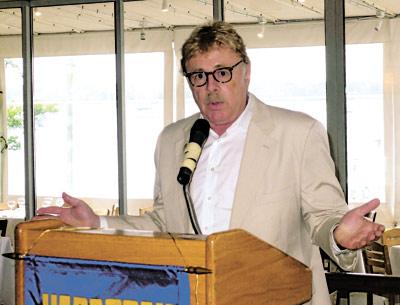Bruises and Lessons in Local Race

In 2011, Steven Gaines, an author and radio and television host, ran for public office and, as a result, had what he called a life-changing experience.
Mr. Gaines described his run for the East Hampton Town Board as the guest of honor at the Hamptons Sara Chapter of Hadassah’s annual summer lunch Friday at East Hampton Point restaurant.
He said that he had written a book about being handed the Republican nomination by East Hampton Town Supervisor Bill Wilkinson and what followed, but that his proposal has so far met with rejection from publishers. He was told, he said, that the book was “too local” and that it might be a better sell if he added some celebrities.
Mr. Gaines rose to prominence here after the 1998 publication of “Philistines at the Hedgerow: Passion and Property in the Hamptons.” He began his writing career as music columnist at The New York Daily News. He was among the key founders of the Hamptons International Film Festival. His “Sunday Brunch Live” from Sag Harbor’s American Hotel was heard for many years on the Southampton public radio station, WLIU.
Reading from the book proposal, Mr. Gaines recounted the period leading up to his being named to the Republican slate, despite being, in his words, a gay, Jewish Democrat. He described a private lunch with Mr. Wilkinson at Rowdy Hall in East Hampton Village at which he was offered the nomination after a 90-minute conversation.
Leading up to the fateful meeting, Mr. Gaines said, had been a quick sequence of events in which he had met Town Councilwoman Theresa Quigley and her husband on the beach. This led to a meeting with Trace Duryea, the then-Republican Committee chairwoman.
Mr. Gaines said that he was struck during the lunch at Rowdy Hall that Mr. Wilkinson “didn’t seem to know anything about me.”
When pressed, Mr. Wilkinson, a former Disney corporate human relations executive, said that he liked Mr. Gaines’s “brains” and the way he thought.
“This seemed dicey to me,” Mr. Gaines said. “Is this the way he filled thousands of positions at Disney?”
Mr. Wilkinson, apparently sensing hesitation, said, “Last call: Yes or no?”
“Not a single virtuous thought came into my head,” Mr. Gaines said. “If I said no, I’d surely regret it. ‘Maybe I can do something,’ ” he recalled thinking.
Mr. Gaines agreed to join the ticket with Mr. Wilkinson, who was seeking re-election, and Richard Haeg, whom he described as an “archconservative.”
In a profanity-laced jest, Mr. Wilkinson told him that if he changed his mind, he would, “kill me.”
Mr. Gaines likened the decision to “stepping into an open manhole.” Old friends stopped speaking to him. Some of his campaign signs were defaced.
Mr. Wilkinson, he said, also took a degree of abuse for naming him to the ticket. There were “explosive shouting matches” in Town Hall, Mr. Gaines said. John Behan, a former town G.O.P. leader and disabled Vietnam War veteran who wanted his wife, Marilyn, to get the nomination objected in a heated phone call to the supervisor, he said. Ms. Behan went on the get the Independence Party nod.
Democrats considered him a turncoat, he said. Gays and lesbians called him a traitor, and he said fellow Jews called him an embarrassment.
“ ‘Shame on you,’ people said to me in restaurants,” he said.
“Believe me, there are terrible people on both sides.”
Mr. Gaines reserved particular enmity for the actor Alec Baldwin, a part-time Amagansett resident and a founder of the East Hampton Conservators, a political action committee closely allied with local Democrats. He said Mr. Baldwin had “gained control” of the East Hampton Democratic Party through his sizeable cash donations.
He also said he was ousted from the East Hampton Library’s Author’s Night roster and that the Long Island Gay and Lesbian Alliance would not return his call seeking its endorsement.
Nor would the Suffolk Conservative Party give him its backing. Mr. Gaines described a grim meeting at Villa Paul, a Hampton Bays restaurant, during which his pitch was met with blank stares at first, then applause when he made a straight-up plea about why he would need their support in a six-way contest. The party endorsed his running mate, Mr. Haeg, but left its other line for town board blank.
Once Election Day came and went, Mr. Gaines ended up in fourth place out of a field of six running for two open seats. The two Democrats, Sylvia Overby and Peter Van Scoyoc, had won, followed by Mr. Haeg, with Mr. Gaines just 20 votes back. Trailing him were Bill Mott and Ms. Behan, the Independence Party candidates.
During the campaign, he recalled, he met plenty of decent people. What began as an admittedly “vanity run” for him ended up delivering an education and increased his belief in representative government and the good qualities of most people.
“After so many years of writing and talking and thinking about East Hampton, I found its soul and heart by trying to win its votes,” Mr. Gaines said.
“Ultimately, running for office was an inspiring lesson about how democracy manages to work, despite itself, even in a place where the grassroots are on manicured lawns.”
